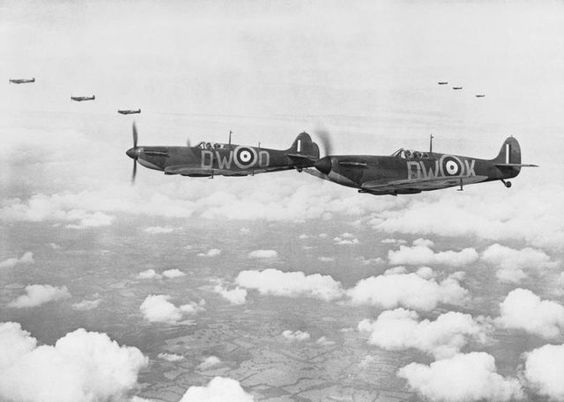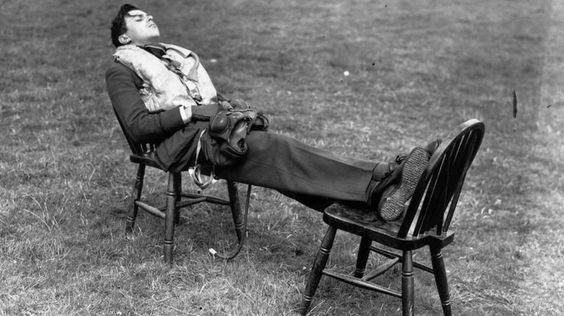Wednesday 24 July 1940
 |
| Supermarine Spitfire Mark Is of No. 610 Squadron based at Biggin Hill, flying in 'Vic' formation. 24 July 1940. [© IWM (CH 740)]. |
Another attack on the same convoys (there are two convoys in the same area) has quite a different result. It begins at 11:00, again by Dornier Do 17 bombers escorted by JG26 and JG 52. Some Dorner Do 215s also showed up. RAF No. 54 Squadron goes up again. This is a massive formation including some 40 Bf 109s, so the RAF also scrambles RAF Nos. 64 and 610 Squadrons - all Spitfires.
This time, the RAF gets the better of the Germans. The Dorniers are under intense pressure, fleeing every which way out to sea and over Margate at the rooftop level. There are intricate dogfights marked by fighter contrails.
JG 26, one of the elite Luftwaffe squadrons, has a very bad day. Most of it has just returned to the French coast from Germany, and it appears to be a bit rusty. JG 26 loses three pilots, including the Gruppenkommandeur of II Gruppe, Hauptmann Erich Noack.
The British claim 16 fighter victories, but actual Luftwaffe losses are much lower. The Germans lose four III,/JG52 fighters, three JG26 fighters, and one from III,/JG27.
Karl Ebbinghausen, a top ace, is promoted to replace Noack. Hauptmann Adolph Galland of III,/JG26, who gets a victory, remembered this day as the final evidence that "the RAF would prove to be a formidable opponent." The attrition strategy is wearing on the Germans, too.
In the evening, the Luftwaffe sends another small attack against the Channel convoys at 17:27. Once again, the bombers - Dornier Do 215s - acquit themselves well, shooting down two Spitfires for the loss of one of their own number.
Aside from the air battles, it is a good day for the German bombers. The Luftwaffe sinks 356-ton minesweeping trawler HMS Fleming in the Thames estuary. There are three survivors, and 19 crew perish.
The Luftwaffe sinks Royal Navy trawlers HMS Kingston Galena (350 tons) and Rodino (230 tons) off of Dover. There are 16 deaths on the former and 4 on the latter.
British freighter Alert is bombed and damaged by the Luftwaffe near South Goodwin Light Vessel.
On land, there are scattered bombing raids on Walton-on-Thames, aircraft factories at Weybridge, and the Brooklands airfield. The last is an odd attack, as the solo Junkers Ju 88 bomber pretends to be an innocent visitor, circling the airfield seemingly in a holding pattern preparatory to landing. It allows several RAF planes to land, then comes in for a landing itself with wheels down - only to drop a dozen bombs and scoot off.
After dark, there are minor Luftwaffe bomber attacks on Glasgow and New Brighton, with the Luftwaffe perhaps losing a bomber during the latter action.
Battle of the Atlantic: Finnish freighter Trio (1451 tons) hits a mine near Borkum and sinks. Everybody survives.
Convoy FN 231 departs Southend, Convoy MT 119 departs Methil, Convoy FS 231 departs from the Tyne.
German raider Widder takes on supplies from aptly named freighter Rekum.
The Kriegsmarine continues its minelaying operations in the North Sea which the Admiralty on 23 July thought was an invasion force.
U-139 is commissioned.
Battle of the Mediterranean: Liner Celio (3864 tons) hits a mine and sinks about 10 miles off the eastern Libyan coast. The mine had been laid by the British submarine HMS Rorqual on 21 July.
The situation on Malta is growing critical, so the Admiralty sets in motion a convoy to reinforce the dwindling fighter defenses on the island. Royal Navy aircraft carrier HMS Argus sets off from Portland carrying a dozen Hurricane fighters, accompanied by destroyers Gallant and Greyhound, bound for Gibraltar. There, the plan is for them to rendezvous with other ships to form Convoy Hurry bound for Malta. They will bring only the most urgently needed supplies, as they face air attacks from Vichy France and Italy, as well as Italian submarine and surface vessel attacks.
Separately, supply ships set out to make the long trip around Africa to Suez. Aside from the very few and highly risky missions "up the gut" through the Pillars of Hercules, all supplies sent to Malta take the long route, which takes weeks.
On the island itself, there are some minor attacks on Grand Harbour which cause no damage because, as is often the case, the Italian pilots simply drop their bombs in the sea and then scramble for home.
Elsewhere, the RAF bombs Bardia and Macaca, causing damage to infrastructure.
War Crimes: The Meknés: While improper things happen in the fog of war by accident, sometimes an action crosses the line due to the circumstances. It is always a judgment call what is a "crime," but I put things (such as the British regularly shooting down clearly marked German rescue and recovery planes) in this category when circumstances appear to cross that line. Invariably, the offending government finds some flimsy excuse to justify the clearly illegal action. In the British case, it is that the German planes actually are serving as scouts for later Luftwaffe attacks. Here, the excuse appears even flimsier, but that, again, is a judgment call, and all too often nobody with the ability to do anything is empowered to make that call.
French liner Meknés (6127 tons) is repatriating French sailors captured during Operation Catapult on 3 July to Marseilles when Kriegsmarine S-Boot (fast torpedo boat) S.27 sinks it off Dieppe. Of the 1277 Frenchmen on board, 383 perish (sources vary), while 33 of the 104 crew also perish. There would be more deaths, but destroyers HMS Viscount, Wolverine Sabre and Shikari are nearby and quickly rescue whoever they can. The Meknes is flying the French flag and was sailing with lights on at 22:30, so the attack is either mistaken or misguided. The British lodge a diplomatic protest, and the excuse ultimately given is that the British should have notified the Germans of the ship's departure.
The true explanation is simply that the German commander, an Oberleutnant Klug, is being overly aggressive. The ship, operating in peacetime conditions, sticks out like a sore thumb, with every other ship operating in darkness. As a surface ship, the S-boot crew must have a good look at the liner, and the night is clear, so there are few valid excuses.
It is highly unlikely that the very traditional and often quite reasonable higher officers of the Kriegsmarine want incidents like this to happen (your opinion may vary). This incident illustrates that the war is being fought by individuals with power to destroy and cause problems on their own initiative, not by governments that always have absolute control over what their people do (and, to be fair, individuals on both sides sometimes act in a humane fashion that their governments disapprove of, see the later Laconia incident for example). A steady succession of incidents like this - and failure by the governments of both sides to take true responsibility - is what turns the war toward an ever-more barbarous course. The French have no way to retaliate against the Reich... yet.
This incident is well-remembered in France, not so much in the English-speaking countries. An association to remember the incident was formed in 2009 and commemorative ceremonies take place in France every 24th of July.
 |
| Actress Dolores Del Rio and Orson Welles go fishing off Catalina Island and have a huge catch of barracuda and yellowtail. July 24, 1940 |
Kenya: South Africa increases its war presence by shipping the 1st Infantry Brigade to Mombasa.
Romanian Government: Romania nationalizes Royal Dutch/Shell Oil Company) subsidiary Astra-Romana Oil Company on the flimsy excuse that it has not been transparent about its production.
British Government: Member of Parliament Will Thorpe raises perhaps the most novel approach for ending the war ever proposed. During the Minister's Question Time, Thorpe remarks that the war would end quickly once "Hitler married a sensible woman." Eva Braun may be thinking the same thing, and, in point of fact...
Winston Churchill finally lifts the media ban on the sinking of the Lancastria of 17 June 1940. In that action, some 1,738 people were killed (sources vary) during the evacuation from France, one of the greatest naval disasters in Royal Navy history. Until now, there only have been rumors, fed by the increasingly obvious absence of the victims. Now, there is a certainty, and many sad relatives who at least now have closure.
July 1940
July 1, 1940: Vichy France
July 2, 1940: Arandora Star
July 3, 1940: Operation Catapult at Mers El Kébir
July 4, 1940: Romania In Crisis
July 5, 1940: The Five Freedoms
July 6, 1940: Hitler's High Point
July 7 1940: Dakar And Ringo
July 8, 1940: Tea Rationing in England
July 9, 1940: Battle of Calabria
July 10, 1940: Battle of Britain Begins
July 11, 1940: "Nous, Philippe Petain"
July 12, 1940: Enter Laval
July 13, 1940: German Surface Raiders Attack!
July 14, 1940: Bastille/Mourning Day
July 15, 1940: Tallest Man Dies
July 16, 1940: Plans for Sea Lion
July 17, 1940: Burma Road Closed
July 18, 1940: FDR Runs Again
July 19, 1940: Last Appeal To Reason
July 20, 1940: First Night Fighter Victory
July 21, 1940: Soviets Absorb Baltic States
July 22, 1940: First RAF Night Fighter Victory
July 23, 1940: Invasion False Alarm
July 24, 1940: The Meknés Incident
July 25, 1940: Black Thursday for RAF
July 26, 1940: Capture The Duke?
July 27, 1940: What's Up, Doc?
July 28, 1940: Destroyers Pulled From Dover
July 29, 1940: Barbarossa On The Burner
July 30, 1940: Hitler Delays Sealion
July 31, 1940: Bloody Wednesday of Olkusz
2020

No comments:
Post a Comment